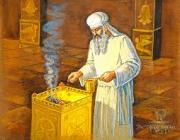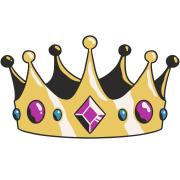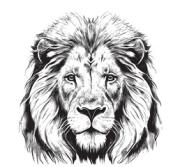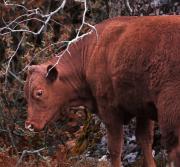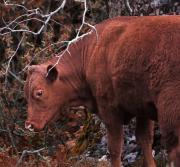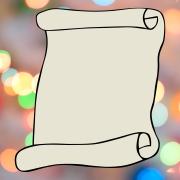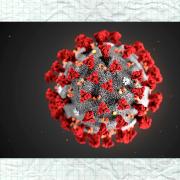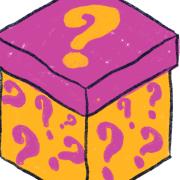It is written (Bereshit 1:2)
וְר֣וּחַ אֱלֹהִ֔ים מְרַחֶ֖פֶת עַל־פְּנֵ֥י הַמָּֽיִם
"And the spirit of 'ELOKIM' hovered over the face of the waters"
זֶה רוּחוֹ שֶׁל מֶלֶךְ הַמָּשִׁיחַ הֵיאַךְ מָה דְאַתְּ אָמַר (ישעיה יא ב) וְנָחָה עָלָיו רוּחַ ה
The spirit refers to king Mashiach as it is written "And the spirit of The LORD will rest upon him!" (Isaiah 11:2)(Midrash Rabbah)
שֶׁלִּבּוֹ הוּא לֵב כָּל קְהַל יִשְׂרָאֵל
"his heart is the heart of all the Jewish people"
(Rambam Mishna Torah Melachim 3:6)
מִפְּנֵי שֶׁאוֹתוֹ הַמֶּלֶךְ שֶׁיַּעֲמֹד מִזֶּרַע דָּוִד בַּעַל חָכְמָה יִהְיֶה יֶתֶר מִשְּׁלֹמֹה וְנָבִיא גָּדוֹל הוּא קָרוֹב לְמשֶׁה רַבֵּנוּ וּלְפִיכָךְ יְלַמֵּד כָּל הָעָם וְיוֹרֶה אוֹתָם דֶּרֶךְ ה' וְיָבוֹאוּ כָּל הַגּוֹיִם לְשָׁמְעוֹ שֶׁנֶּאֱמַר (ישעיה ב ב) וְהָיָה בְּאַחֲרִית הַיָּמִים נָכוֹן יִהְיֶה הַר בֵּית ה' בְּרֹאשׁ הֶהָרִים
for/because this king Mashiach will arise from the seed of David and will be gifted with wisdom more than Solomon and great in prophecy close to Moshe our Master. He will therefore teach the people and point out to them the LORD's path, and all nations will come to listen to him as it is written "And it shall come to pass in the last days, that the mountain of The LORD shall be established on the top of the mountains" (Isaiah 2:2)
(Rambam Mishna Torah Teshuva 9:2)
רַבִּי נָתָן אוֹמֵר אָמַר הַקָּדוֹשׁ בָּרוּךְ הוּא לְמשֶׁה כְּשֵׁם שֶׁעָשִׂיתִי יַעֲקֹב בְּכוֹר שֶׁנֶּאֱמַר (שמות ד כב) בְּנִי בְכֹרִי יִשְׂרָאֵל כָּךְ אֲנִי עוֹשֶׂה לְמֶלֶךְ הַמָּשִׁיחַ בְּכוֹר שֶׁנֶּאֱמַר (תהלים פט כח) אַף־אָ֭נִי בְּכ֣וֹר אֶתְּנֵ֑הוּ עֶ֝לְי֗וֹן לְמַלְכֵי־אָֽרֶץ
Rabbi Natan said "The Holy One Blessed Is He said to Moshe "Just as I made Yaakov a firstborn, so too I will make king Mashiach a firstborn as it is written "I too will make him a firstborn, supreme over all the kings of the earth" (Psalms 89:28)(Midrash Rabbah)
ר' יהושע בן לוי אשכח לאליהו אמר ליה ומאי סימניה
Rabbi Yehoshua the son of Levi encountered Eliyahu the Prophet and asked him, how do we know who is the Mashiach?
יתיב ביני עניי סובלי חלאים
Eliyahu the Prophet answered him "The Mashiach sits among the poor and suffers from afflictions" (Sanhedrin 98a)
נִבְזֶה֙ וַחֲדַ֣ל אִישִׁ֔ים אִ֥ישׁ מַכְאֹב֖וֹת וִיד֣וּעַ חֹ֑לִי וּכְמַסְתֵּ֤ר פָּנִים֙ מִמֶּ֔נּוּ נִבְזֶ֖ה וְלֹ֥א חֲשַׁבְנֻֽהוּ
"he is despised, shunned by men, a man of suffering, familiar with illness, as one who hid his face from us, he was despised, we held him of no account" (Isaiah 53:3)
אָכֵ֤ן חֳלָיֵ֙נוּ֙ ה֣וּא נָשָׂ֔א וּמַכְאֹבֵ֖ינוּ סְבָלָ֑ם וַאֲנַ֣חְנוּ חֲשַׁבְנֻ֔הוּ נָג֛וּעַ מֻכֵּ֥ה אֱלֹהִ֖ים וּמְעֻנֶּֽה
"Yet it was our sickness that he was bearing, our suffering that he endured. We accounted him plagued, smitten, and afflicted by GOD" (Isaiah 53:4)
וְהוּא֙ מְחֹלָ֣ל מִפְּשָׁעֵ֔נוּ מְדֻכָּ֖א מֵעֲוֺנֹתֵ֑ינוּ מוּסַ֤ר שְׁלוֹמֵ֙נוּ֙ עָלָ֔יו וּבַחֲבֻרָת֖וֹ נִרְפָּא־לָֽנוּ
"But he was wounded because of our sins, crushed because of our iniquities. He bore the chastisement that made us whole, and by his bruises, we were healed" (Isaiah 53:5)
נִגַּ֨שׂ וְה֣וּא נַעֲנֶה֮ וְלֹ֣א יִפְתַּח־פִּיו֒ כַּשֶּׂה֙ לַטֶּ֣בַח יוּבָ֔ל וּכְרָחֵ֕ל לִפְנֵ֥י גֹזְזֶ֖יהָ נֶאֱלָ֑מָה וְלֹ֥א יִפְתַּ֖ח פִּֽיו
"He was oppressed yet he did not open his mouth to answer back, like sheep being led to slaughter, like a ewe dumb before those who shear her he did not open his mouth" (Isaiah 53:7)
וַיהֹוָ֞ה חָפֵ֤ץ דַּכְּאוֹ֙ הֶחֱלִ֔י אִם־תָּשִׂ֤ים אָשָׁם֙ נַפְשׁ֔וֹ יִרְאֶ֥ה זֶ֖רַע יַאֲרִ֣יךְ יָמִ֑ים וְחֵ֥פֶץ יְהֹוָ֖ה בְּיָד֥וֹ יִצְלָֽח
"But The LORD chose to crush him with suffering, if he accepted his suffering with joy he will see offspring and have a long life, and in the Torah of the LORD he will prosper" (Isaiah 53:11)
חַיִּ֤ים שָׁאַ֣ל מִ֭מְּךָ נָתַ֣תָּה לּ֑וֹ אֹ֥רֶךְ יָ֝מִ֗ים עוֹלָ֥ם וָעֶֽד
"he asked You for life and You granted him, a long life, everlasting"
(Psalms 21:5)
קָנָה לוֹ דִבְרֵי תוֹרָה קָנָה לוֹ חַיֵּי הָעוֹלָם הַבָּא
if you have acquired words of The Torah! you have acquired The Life of The World To Come!" (Avot)
צַדִּיק וּמוֹשִׁיעַ אֵין כְּתִיב אֶלָּא צַדִּיק וְנוֹשַׁע הוּא וְכֵן הוּא אוֹמֵר אִמְרוּ לְבַת צִיּוֹן הִנֵּה יִשְׁעֵךְ בָּא (ישעיה סב יא) מוֹשִׁיעֵךְ בָּא אֵין כְּתִיב כָּאן אֶלָּא יִשְׁעֵךְ כִּבְיָכוֹל הוּא נוֹשַׁע
It is not written about king Mashiach "he is righteous and a savior" rather "he is righteous and he will be saved" as it is written "Say to the daughter of Zion behold the one who was saved has come" (Isaiah 62:11) (Tanhuma)
לָכֵ֞ן אֲחַלֶּק־ל֣וֹ בָרַבִּ֗ים וְאֶת־עֲצוּמִים֮ יְחַלֵּ֣ק שָׁלָל֒ תַּ֗חַת אֲשֶׁ֨ר הֶעֱרָ֤ה לַמָּ֙וֶת֙ נַפְשׁ֔וֹ וְאֶת־פֹּשְׁעִ֖ים נִמְנָ֑ה וְהוּא֙ חֵטְא־רַבִּ֣ים נָשָׂ֔א וְלַפֹּשְׁעִ֖ים יַפְגִּֽיעַ
"Therefore, I will give him a portion from the multitudes, he will divide the mighty as spoils because he poured out his soul in repentance to death. He was numbered among the sinners, he bore the guilt of the many, he prayed for sinners” (Isaiah 53:12)
אָמַר רַבִּי אַבָּא סָרוֹנְגַיָא וּנְהוֹרָא עִמֵּהּ שְׁרֵא זֶה מֶלֶךְ הַמָּשִׁיחַ שֶׁנֶּאֱמַר ק֥וּמִי א֖וֹרִי כִּ֣י בָ֣א אוֹרֵ֑ךְ וּכְב֥וֹד יְהֹוָ֖ה עָלַ֥יִךְ זָרָֽח
Rabbi Abba Sarongia says, it is written "light dwells with him" (Daniel 2:22) this refers to king Mashiach as it is written "Arise, shine, for your light has dawned, The Presence of The LORD has shone upon you" (Isaiah 60:1) (Midrash Rabbah)
וְנָחָ֥ה עָלָ֖יו ר֣וּחַ יְהֹוָ֑ה ר֧וּחַ חׇכְמָ֣ה וּבִינָ֗ה ר֤וּחַ עֵצָה֙ וּגְבוּרָ֔ה ר֥וּחַ דַּ֖עַת וְיִרְאַ֥ת יְהֹוָֽה
"The spirit of the LORD shall rest upon him, a spirit of wisdom and understanding, a spirit of counsel and might, a spirit of knowledge,
and reverence for The LORD" (Isaiah 11:2)
וַהֲרִיח֖וֹ בְּיִרְאַ֣ת יְהֹוָ֑ה וְלֹֽא־לְמַרְאֵ֤ה עֵינָיו֙ יִשְׁפּ֔וֹט וְלֹא־לְמִשְׁמַ֥ע אׇזְנָ֖יו יוֹכִֽיחַ
"He shall sense the truth by his reverence for the LORD, he shall not judge by what his eyes behold, nor rebuke by what his ears perceive" (Isaiah 11:3)
וְשָׁפַ֤ט בְּצֶ֙דֶק֙ דַּלִּ֔ים וְהוֹכִ֥יחַ בְּמִישׁ֖וֹר לְעַנְוֵי־אָ֑רֶץ וְהִֽכָּה־אֶ֙רֶץ֙ בְּשֵׁ֣בֶט פִּ֔יו וּבְר֥וּחַ שְׂפָתָ֖יו יָמִ֥ית רָשָֽׁע וְהָ֥יָה צֶ֖דֶק אֵז֣וֹר מׇתְנָ֑יו וְהָאֱמוּנָ֖ה אֵז֥וֹר חֲלָצָֽיו
"he will judge the poor and instruct justly the humble of the earth, he will reprove the inhabitants with his mouth, and with the breath of his mouth, he will smite the wicked. Justice shall be the girdle of his loins, and faithfulness the girdle of his waist" (Isaiah 11:4-5)
שֶׁנֶּאֱמַר (זכריה ט א) מַשָֹּׂא דְּבַר ה' בְּאֶרֶץ חַדְרָךְ מַהוּ חַדְרָךְ רַבִּי נְחֶמְיָה אָמַר זֶה מֶלֶךְ הַמָּשִׁיחַ שֶׁהוּא חַד וְרַךְ חַד לָאֻמּוֹת וְרַךְ לְיִשְׂרָאֵל דָּבָר אַחֵר חַדְרָךְ זֶה מֶלֶךְ הַמָּשִׁיחַ שֶׁעָתִיד לְהַדְרִיךְ כָּל בָּאֵי הָעוֹלָם בִּתְשׁוּבָה לִפְנֵי הַקָּדוֹשׁ בָּרוּךְ הוּא
It is written "A prophecy of the LORD in the land of hadrach" (Zecharia 9:1) What does the word 'hadrach' (חַדְרָךְ) mean? Rabbi Nehemia said this refers to King Moshiach who is sharp(חַדְ) and soft(רָךְ). Sharp towards the idolaters and soft to the people of Israel. Another explanation: The word (חַדְרָךְ) refers to king Mashiach who is destined to guide (לְהַדְרִיךְ) the people of the world to repentance before The Holy One Blessed Is He (Midrash Rabbah)
שֶׁמֶן לַמָּאוֹר זֶה מֶלֶךְ הַמָּשִׁיחַ שֶׁנֶּאֱמַר שָׁם אַצְמִיחַ קֶרֶן לְדָוִד עָרַכְתִּי נֵר לִמְשִׁיחִי (תהלים קלב יז)
"The oil for the light" (Exodus 25:6) This refers to the king Mashiach as it is written "There will I make a horn to shoot up for David, there have I prepared a lamp for My anointed" (Psalms 132:17)(Tanhuma)
הַמָּשִׁיחַ שֶׁעָתִיד לִפָּרַע מֵעוֹבְדֵי עֲבוֹדָה זָרָה שָׁם עִמָּהֶם גָּדֵל בַּמְּדִינָה דִּכְתִיב שָׁם יִרְעֶה עֵגֶל וְשָׁם יִרְבָּץ וְכִלָּה סְעִפֶיהָ (ישעיה כז י)
king Mashiach is destined to exact retribution from the idolaters. He will live among them in their city as it is written "There shall the calf feed and there shall he lie down and consume the branches thereof" (Isaiah 27:10) (Tanhuma)
וְהוּא הָיָה רוֹאֶה אֶת מֶלֶךְ הַמָּשִׁיחַ שֶׁכֵּן דָּנִיֵּאל אוֹמֵר חָזֵהּ הֲוַיְתָ עַד דִּי הִתְגְּזֶרֶת אֶבֶן דִּי לָא בִידַיִן וּמְחָת לְצַלְמָא בֶּן לָקִישׁ זֶה מֶלֶךְ הַמָּשִׁיחַ וּמְחָת לְצַלְמָא לְכָל מַלְכוּת שֶׁהֵם עוֹבְדוֹת לַצֶּלֶם בְּצַלְמָוֶת וּבִזְכוּת מָה הוּא מוֹשֵׁל מֶלֶךְ הַמָּשִׁיחַ בָּאֶבֶן? בִּזְכוּת הַתּוֹרָה שֶׁיִּשְׂרָאֵל יְגֵעִים בָּהּ שֶׁנֶּאֱמַר לֻחֹת אֶבֶן כְּתֻבִים בְּאֶצְבַּע אֱלֹהִים (שמות לא יח)
Daniel the prophet saw the coming of the Messiah (in his vision), as Daniel said "I saw a stone was cut out without hands, which smote the image upon its feet that were of iron and clay, and broke them in pieces" (Daniel 2:34) Rabbi Simeon the son of Lakish said "This verse refers to the Messiah" Smote the image alludes to all the kingdoms that serve idols. Why is the rule of king Mashiach likened to stone? It is likened to stone because of the Torah study in which Israel toils as it is written "The two tablets of the testimony, tables of stone written with the finger of GOD" (Exodus 31:18)(Tanhuma)
מֶלֶךְ בָּשָׂר וָדָם אֵין לוֹבְשִׁין עֲטָרָה שֶׁלּוֹ וְהַקָּדוֹשׁ בָּרוּךְ הוּא עָתִיד לְהַלְבִּישׁ עֲטָרָה שֶׁלּוֹ לְמֶלֶךְ הַמָּשִׁיחַ וּמַהוּ עֲטָרָה שֶׁל הַקָּדוֹשׁ בָּרוּךְ הוּא? כֶּתֶם פָּז שֶׁנֶּאֱמַר רֹאשׁוֹ כֶּתֶם פָּז (שה״ש ה יא) וְכָתוּב בּוֹ תָּשִׁית לְרֹאשׁוֹ עֲטֶרֶת פָּז (תהלים כא ד)
No one would dare don the crown of a human king, but in the future, The Holy One Blessed Is He will place His crown upon the head of king Mashiach. What is the crown of The Holy One Blessed Is He? The crown of The Holy One Blessed Is He is of the finest gold as it is written "His head is covered with hat made of a special garment, full of Torah" (Song of Songs 5:11) and it is also written "You will set a crown of fine gold on his head" (Psalms 21:4) (Tanhuma)
אָמַר רַבִּי אֶלְעָזָר בַּר אֲבִינָא אִם רָאִיתָ מַלְכֻיּוֹת מִתְגָּרוֹת אֵלּוּ בְּאֵלּוּ צַפֵּה לְרַגְלוֹ שֶׁל מָשִׁיחַ
Rabbi Elazar the son of Abina said "If you see in your generation that all the nations engaged in conflict with one another, expect the coming of the Mashiach" (Midrash Rabbah)
רַבִּי בֶּרֶכְיָה אָמַר בְּשֵׁם רַבִּי יִצְחָק כַּגּוֹאֵל רִאשׁוֹן כָּךְ גּוֹאֵל אַחֲרוֹן מַה גּוֹאֵל רִאשׁוֹן נֶאֱמַר (שמות ד כ) וַיִּקַּח משֶׁה אֶת אִשְׁתּוֹ וְאֶת בָּנָיו וַיַּרְכִּבֵם עַל הַחֲמֹר כָּךְ גּוֹאֵל אַחֲרוֹן שֶׁנֶּאֱמַר (זכריה ט ט) עָנִי וְרֹכֵב עַל הַחֲמוֹר מַה גּוֹאֵל הָרִאשׁוֹן הוֹרִיד אֶת הַמָּן שֶׁנֶּאֱמַר (שמות טז ד) הִנְנִי מַמְטִיר לָכֶם לֶחֶם מִן הַשָּׁמָיִם אַף גּוֹאֵל אַחֲרוֹן יוֹרִיד אֶת הַמָּן שֶׁנֶּאֱמַר (תהלים עב טז) יְהִי פִסַּת בַּר בָּאָרֶץ מַה גּוֹאֵל רִאשׁוֹן הֶעֱלָה אֶת הַבְּאֵר אַף גּוֹאֵל אַחֲרוֹן יַעֲלֶה אֶת הַמַּיִם שֶׁנֶּאֱמַר (יואל ד יח) וּמַעְיָן מִבֵּית ה' יֵצֵא וְהִשְׁקָה אֶת נַחַל הַשִּׁטִּים
Rabbi Berechiah in the name of Rabbi Itzhak said "Like the first redeemer Moshe so too the final redeemer king Mashiach. Just like regarding Moshe, it is written: "Moshe took his wife and his children and mounted them on the donkey" (Exodus 4:20) so does it say of the final redeemer as it is written "A poor man riding upon a donkey"(a family man, battling his evil inclination, toiling in Torah, providing for his family) (Zechariah 9:9) Just as the first redeemer caused the manna to fall in the wilderness as it is written "Behold, I shall rain down for you food from Heaven" (Exodus 16:4) so will the final redeemer cause the manna to fall as it is written "There shall be an abundance of bread on the earth" (Psalms 72:16) Just as the first redeemer caused the water of the well to raise up so will the final redeemer as it is written "a spring will go out from the House of Hashem and water the valley of Shittim" (Joel 4:18)(Just as in the wilderness, having been granted the manna and water from the well, the people were free to devote their time to the study of Torah and service of The Holy One Blessed Is He, the same will occur in the times of Mashiach) (Tiferet Zion) (Midrash Rabbah)
הַמֶּלֶךְ הַמָּשִׁיחַ עָתִיד לַעֲמֹד וּלְהַחְזִיר מַלכוּת דָּוִד לְיָשְׁנָהּ לַמֶּמְשָׁלָה הָרִאשׁוֹנָה וּבוֹנֶה הַמִּקְדָּשׁ וּמְקַבֵּץ נִדְחֵי יִשְׂרָאֵל וְחוֹזְרִין כָּל הַמִּשְׁפָּטִים בְּיָמָיו כְּשֶׁהָיוּ מִקֹּדֶם
king Mashiach will arise and re-establish the monarchy of David as it was in former times. He will build the Temple and gather in the dispersed of Israel. All the earlier statutes will be restored as they once were (Rambam Mishna Torah Melachim 11:1)
וְאַל יַעֲלֶה עַל דַּעְתְּךָ שֶׁהַמֶּלֶךְ הַמָּשִׁיחַ צָרִיךְ לַעֲשׂוֹת אוֹתוֹת וּמוֹפְתִים וּמְחַדֵּשׁ דְּבָרִים בָּעוֹלָם אוֹ מְחַיֶּה מֵתִים וְכַיּוֹצֵא בִּדְבָרִים אֵלּוּ אֵין הַדָּבָר כָּךְ
It should not occur to you that the king Machiach must bring wondrous signs or perform marvels or invent new things or revive the dead or anything like that
(Rambam Mishna Torah Melachim 11:3)
אָמַר רַבִּי חָנִין אֵין יִשְׂרָאֵל צְרִיכִין לְתַלְמוּדוֹ שֶׁל מֶלֶךְ הַמָּשִׁיחַ לֶעָתִיד לָבוֹא שֶׁנֶּאֱמַר (ישעיה יא י) אֵלָיו גּוֹיִם יִדְרשׁוּ לֹא יִשְׂרָאֵל אִם כֵּן לָמָּה מֶלֶךְ הַמָּשִׁיחַ בָּא וּמַה הוּא בָּא לַעֲשׂוֹת לְכַנֵּס גָּלֻיּוֹתֵיהֶן שֶׁל יִשְׂרָאֵל
Rabbi Chanin said "The nation of Israel will not need the teachings of king Mashiach as it is written "nations will seek him" (Isaiah 11:10) implying "the nations" and not Israel. Then, for what purpose will he come? he will gather the exiles (Midrash Rabbah)
רַבָּנָן אָמְרוּ גָּדוֹל שָׁלוֹם שֶׁכְּשֶׁמֶּלֶךְ הַמָּשִׁיחַ בָּא אֵינוֹ פּוֹתֵחַ אֶלָּא בְּשָׁלוֹם שֶׁנֶּאֱמַר (ישעיה נב ז) מַה נָּאווּ עַל הֶהָרִים רַגְלֵי מְבַשֵּׂר מַשְׁמִיעַ שָׁלוֹם
The Rabbis of Blessed Memory said "great is peace for when King Mashiach will come he will only open with peace as it is written "How pleasant on the mountains are the feet of the messenger proclaiming peace!" (Isaiah 52:7)
It is written וּמַטֵּ֥ה אַהֲרֹ֖ן
"And the staff of Aharon" (Bamidbar 17:21)
יֵשׁ אוֹמְרִים הוּא הַמַּטֶּה שֶׁהָיָה בְּיַד יְהוּדָה
Some Rabbis of Blessed Memory say that this is the same staff that of Yehuda as it is written וּמַטְךָ אֲשֶׁר בְּיָדֶךָ
"The staff that is in your hand" (Bereshit 38:18)
וְאוֹתוֹ הַמַּטֶּה עָתִיד לִהְיוֹת בְּיַד מֶלֶךְ הַמָּשִׁיחַ בִּמְהֵרָה בְיָמֵינוּ
And this is the exact staff that in the future will be held by the King Mashiach, may he come speedily in our days as it is written
מַטֵּה עֻזְּךָ יִשְׁלַח ה' מִצִּיּוֹן רְדֵה בְּקֶרֶב אֹיְבֶיךָ
"The LORD will stretch forth from Zion your mighty scepter,
to rule over your enemies!" (Psalms 110:2)(Midrash Rabbah)
It is written
מִֽי־אַתָּ֧ה הַֽר־הַגָּד֛וֹל לִפְנֵ֥י זְרֻבָּבֶ֖ל לְמִישֹׁ֑ר
"Who are you? the big mountain! in front of us, from Zerubbabel, who will come to make men upright" (Zechariah 4:7)
זֶה מָשִׁיחַ בֶּן דָּוִד
This refers to king Mashiach the son of David
וְלָמָּה נִקְרָא שְׁמוֹ הַר הַגָּדוֹל
Why is he called the great mountain?
שֶׁהוּא גָדוֹל מִן הָאָבוֹת
Because he is spiritually greater than the Patriarchs as it is written about the king Mashiach
שֶׁנֶּאֱמַר הִנֵּה יַשְׂכִּיל עַבְדִּי יָרוּם וְנִשָּׂא וְגָבַהּ מְאֹד (ישעיה נב יג)
"Behold, my servant will prosper in wisdom and prophecy, he will be exalted and raised to great heights" (Isaiah 52:13)
יָרוּם מֵאַבְרָהָם וְנִשָּׂא מִיִּצְחָק וְגָבַהּ מִיַּעֲקֹב
he will be exalted more than Abraham, uplifted more than Itzhak, and greater than Jacob
וְגָבַהּ מִמַּלְאֲכֵי הַשָּׁרֵת
he will be greater than the ministering angels
שֶׁגְּדוֹלִים הַצַּדִּיקִים יוֹתֵר מִמַּלְאֲכֵי הַשָּׁרֵת
because righteous are greater than the ministering angels
לְכָךְ נֶאֱמַר מִי אַתָּה הַר הַגָּדוֹל
that's why the verse says "who are you? the big mountain!"
וּמִמִּי הוּא יוֹצֵא
From whom will he emerge?
מִזְּרֻבָּבֶל
From Zerubbabel
וְלָמָּה נִקְרָא שְׁמוֹ זְרֻבָּבֶל
Why is his name called Zerubbabel?
מִפְּנֵי שֶׁנּוֹלַד בְּבָבֶל
Because he was born outside of the Land of Israel in Babel
וּמִי הוּא
Who is he descended from?
מִדָּוִד
From King David as it is written
שֶׁנֶּאֱמַר וּבְנֵ֣י אֶלְיוֹעֵינַ֗י הוֹדַוְיָ֡הוּ וְאֶלְיָשִׁ֡יב וּפְלָיָ֡ה וְ֠עַקּ֠וּב וְיוֹחָנָ֧ן וּדְלָיָ֛ה וַעֲנָ֖נִי שִׁבְעָֽה
"And the sons of Elioenai: Hodaviahu and Eliyashiv and Pelaya and Akkuv and Yohanan and Delaya and Ononi—seven"
(1 Chronicle 3:24)
וּמַהוּ עֲנָנִי
Who is Ononi? ( עֲנָנִי - answer me)
זֶה מָשִׁיחַ
This is Mashiach a man of prayer as it is written
שֶׁנֶּאֱמַר חָזֵה הֲוֵית בְּחֶזְוֵי לֵילְיָא וַאֲרוּ עִם עֲנָנֵי שְׁמַיָּ֔א
"I saw in the night visions, and behold, there he came, Ononi
(עֲנָנֵי answer me) is his name" (Daniel 7:13)
in the next verse it is written
וְלֵ֨הּ יְהִ֤ב שׇׁלְטָן֙ וִיקָ֣ר וּמַלְכ֔וּ וְכֹ֣ל עַֽמְמַיָּ֗א אֻמַּיָּ֛א וְלִשָּׁנַיָּ֖א לֵ֣הּ יִפְלְח֑וּן שׇׁלְטָנֵ֞הּ שׇׁלְטָ֤ן עָלַם֙ דִּֽי־לָ֣א יֶעְדֵּ֔ה וּמַלְכוּתֵ֖הּ דִּי־לָ֥א תִתְחַבַּֽל
"Dominion, splendor and kingship were given to him. All nations, nations of every language will pay reverence to him. His dominion is an everlasting dominion that shall not pass away,
and his kingship, one that shall not be destroyed" (Daniel 7:14)
וְשָׁפַ֤ט בְּצֶ֙דֶק֙ דַּלִּ֔ים וְהוֹכִ֥יחַ בְּמִישׁ֖וֹר לְעַנְוֵי־אָ֑רֶץ וְהִֽכָּה־אֶ֙רֶץ֙ בְּשֵׁ֣בֶט פִּ֔יו וּבְר֥וּחַ שְׂפָתָ֖יו
יָמִ֥ית רָשָֽׁע
"he will judge the poor with righteousness and rebuke with uprightness the humble ones of the earth, he will strike down the land with the rod of his mouth and with his holy spirit that will emanate from his mouth he will slay wicked" (Isaiah 11:4)
וְהֵיכָן הוּא בָא
Where will he come from?
דֶּרֶךְ הֶהָרִים
he will come by the way of the mountains as it is written
שֶׁנֶּאֱמַר עַל־הֶהָרִ֜ים רַגְלֵ֣י מְבַשֵּׂ֗ר מַשְׁמִ֧יעַ שָׁל֛וֹם מְבַשֵּׂ֥ר ט֖וֹב מַשְׁמִ֣יעַ יְשׁוּעָ֑ה אֹמֵ֥ר לְצִיּ֖וֹן מָלַ֥ךְ אֱלֹהָֽיִךְ (ישעיה נב ז)
"Upon the mountains are the footsteps of the messenger, proclaiming peace, heralding good news, announcing salvation, telling the nation of Israel “Your King, The Holy One Blessed Is He has Reigned” (Isaiah 52:7)
בְּאוֹתָהּ שָׁעָה יִהְיוּ יִשְׂרָאֵל מִסְתַּכְּלִין וְאוֹמְרִים אֶשָּׂא עֵינַי אֶל הֶהָרִים מֵאַיִן יָבֹא עֶזְרִי עֶזְרִי מֵעִם ה' עֹשֵׂה שָׁמַיִם וָאָרֶץ (תהלים קכא א)
At that time Israel will look up and say "I lift up my eyes unto the mountains, from where will my help come? my help will come from The LORD who made The Heavens and the Earth" (Psalms 121:1)
אָמֵן כֵּן יְהִי רָצוֹן
Amen, and may it be so! (Tanhuma תּוֹלְדֹוֹת)
הִנֵּ֤ה אָנֹכִי֙ שֹׁלֵ֣חַ לָכֶ֔ם אֵ֖ת אֵלִיָּ֣ה הַנָּבִ֑יא
"behold! I will send Elijah The Prophet to you" (Malachi 3:23)
וְהָיָ֣ה בַּיּ֣וֹם הַה֗וּא יִתָּקַע֮ בְּשׁוֹפָ֣ר גָּדוֹל֒
"and on that day a great shofar will be blown" (Isaiah 27:13)
מְשָׁחֵ֖הוּ כִּי־זֶ֥ה הֽוּא
"anoint him! for this is the one!" (1 Samuel 16:12)
מגביהו הקב"ה למשיח עד שמי השמים ופורש עליו מזיו כבודו
"The Holy One Blessed Is He will lift him up to The Heavens and cover him with the splendor of His Glory" (Pesikta Rabatti)
חֹפֵ֤ף עָלָיו֙ כׇּל־הַיּ֔וֹם וּבֵ֥ין כְּתֵפָ֖יו שָׁכֵֽן
"The Holy One Blessed Is He hovers over him all day and resides between his shoulders" (Devarim 33:12)
תוֹרָ֖ה יְבַקְשׁ֣וּ מִפִּ֑יהוּ כִּ֛י מַלְאַ֥ךְ יְהֹֽוָה־צְבָא֖וֹת הֽוּא
"seek Torah form his mouth! because he is the Messenger/Angel of The LORD of HOSTS!" (Malachi 2:7)
יִלָּחֵם מִלְחֲמוֹת ה
"he will wage the wars of The LORD!"(Rambam Melachim 11:4)
קִנְאַ֛ת יְהֹוָ֥ה צְבָא֖וֹת תַּעֲשֶׂה־זֹּֽאת
"the zeal of The LORD of HOSTS this one will perform" (Isaiah 9:6)
וְאֶת־פֹּשְׁעִ֖ים נִמְנָ֑ה
"he was counted among the sinners" (Isaiah 53:12)
וּמִתַּחְתָּ֣יו יִצְמָ֔ח
"he will sprout forth from the bottom" (Zachariah 6:12)
כִּ֣י אָדָ֔ם אֵ֥ין צַדִּ֖יק בָּאָ֑רֶץ אֲשֶׁ֥ר יַעֲשֶׂה־טּ֖וֹב וְלֹ֥א יֶחֱטָֽא
“for there is no righteous person on earth that does good and never sinned” (Kohelet 7:20)
אֲלַמְּדָ֣ה פֹשְׁעִ֣ים דְּרָכֶ֑יךָ
"i will teach the sinners Your ways" (Psalms 51:15)
וּמוֹדֶ֖ה וְעֹזֵ֣ב יְרֻחָֽם
“he who confesses and forsakes his sins will be granted mercy” (Proverbs 28:13)
הֶעֱרָ֤ה לַמָּ֙וֶת֙ נַפְשׁ֔וֹ
"he stirred himself up to death in repentance, in order to know ME!" (Isaiah 53:12)
אָמַר רֵישׁ לָקִישׁ אֵין דִּבְרֵי תוֹרָה מִתְקַיְּימִין אֶלָּא בְּמִי שֶׁמֵּמִית עַצְמוֹ עָלֶיהָ שֶׁנֶּאֱמַר זֹאת הַתּוֹרָה אָדָם כִּי יָמוּת בְּאֹהֶל
"Reish Lakish says "Words of The Torah only endure in a person who kills himself over them, one who is ready to devote all his efforts as it is written “This is the way to acquire the words of The Torah, a person who dies in a tent” ((Numbers 19:14) (Shabbat 83b)
מְנָא לַן דִּשְׁמָא גָּרֵים אָמַר רַבִּי אֱלִיעֶזֶר דְּאָמַר קְרָא לְכוּ חֲזוּ מִפְעֲלוֹת ה׳ אֲשֶׁר שָׂם שַׁמּוֹת בָּאָרֶץ אַל תִּקְרֵי שַׁמּוֹת אֶלָּא שֵׁמוֹת
"From where do we derive that the name affects a person's life? Rabbi Eliezer said that the verse says “Go, see the works of The LORD! who has made desolations [shamot] upon the earth” (Psalms 46:9) Do not read the word as shamot, but rather as shemot - names. The names given to people are therefore “the works of the LORD upon the earth” (Berachot 7b)
מה שמו
"what is his name?
ורבנן אמרי חיוורא דבי רבי שמו
“the Rabbis of Blessed Memory say "the pious/shamefaced one from the house of Ribbi is his name"” (Sanhedrin 98b)
אַתָּה־ה֣וּא מַלְכִּ֣י אֱלֹהִ֑ים
"You are my KING! O LORD!" (Psalms 44:5)
שכל מדותיו של הקב"ה מדה כנגד מדה
the ways of The Holy One Blessed Is He is measure for measure (Sanhedrin 90a)
וַ֭אֲנִי נָסַ֣כְתִּי מַלְכִּ֑י
"and I have anointed 'malki'" (Psalms 2:6)
יַעֲמֹד מֶלֶךְ
"a king will rise up" (Rambam Melachim 11:4)
מַלְכִּי־צֶ֙דֶק֙ מֶ֣לֶךְ שָׁלֵ֔ם
"a righteous king, king of peace, in Jerusalem" (Bereshit 14:18)
וּלְשָׁל֣וֹם אֵֽין־קֵ֗ץ עַל־כִּסֵּ֤א דָוִד֙ וְעַל־מַמְלַכְתּ֔וֹ
"and to peace there will be no end upon the throne of David and his kingdom" (Isaiah 9:6)
מְשִׁ֙יחַ֙ אֱלֹהי יַעֲקֹ֔ב וּנְעִ֖ים זְמִר֥וֹת יִשְׂרָאֵֽל
"the anointed one of our GOD! Yaakov! with pleasing songs/melody/nigun, Israel!" (2 Samuel 23:1)
וּמׇשְׁלוֹ֙ מִיָּ֣ם עַד־יָ֔ם
"he will rule the entire world" (Zechariah 9:10)
וְלֵ֨הּ יְהִ֤ב שׇׁלְטָן֙ וִיקָ֣ר וּמַלְכ֔וּ וְכֹ֣ל עַֽמְמַיָּ֗א אֻמַּיָּ֛א וְלִשָּׁנַיָּ֖א לֵ֣הּ יִפְלְח֑וּן שׇׁלְטָנֵ֞הּ שׇׁלְטָ֤ן עָלַם֙ דִּֽי־לָ֣א יֶעְדֵּ֔ה וּמַלְכוּתֵ֖הּ דִּי־לָ֥א תִתְחַבַּֽל
"Dominion, splendor and kingship were given to him. All nations, nations of every language will pay reverence to him. His dominion is an everlasting dominion that shall not pass away,
and his kingship, one that shall not be destroyed" (Daniel 7:14)
שֶׁקּוֹלוֹ עָרֵב
"because his voice is sweet/pleasing to Me" (Midrash Rabbah)
הַקֹּל֙ ק֣וֹל יַעֲקֹ֔ב
"the voice is the voice of Yaakov" (Bereshit 27:22)
הַרְּאִיתֶם֙ אֲשֶׁ֣ר בָּחַר־בּ֣וֹ יְהֹוָ֔ה
"have you seen whom The LORD/HASHEM has chosen"
(1 Samuel 10:24)
הוֹגֶה בַּתּוֹרָה וְעוֹסֵק בְּמִצְוֹת כְּדָוִד אָבִיו כְּפִי תּוֹרָה שֶׁבִּכְתָב וְשֶׁבְּעַל פֶּה
"his thoughts are pre-occupied with Torah and his performs the mitzvot as his fore-father Kind David, according to the Written and The Oral Torah" (Rambam Mishnah Torah Melachim 11:4)
ה' צַדִּיק יִבְחָן
"The Holy One Blessed Is He tests the righteous" (Psalms 11:5)
שֶׁהַיִּסּוּרִין מוֹשְׁכִין אֶת הָאָדָם לְהַקָּדוֹשׁ בָּרוּךְ הוּא
"for afflictions bring a person closer to The Holy One Blessed Is He"
(Tanhuma)
יָ֘בֵ֤שׁ כַּחֶ֨רֶשׂ כֹּחִ֗י וּ֭לְשׁוֹנִי מֻדְבָּ֣ק מַלְקוֹחָ֑י וְֽלַעֲפַר־מָ֥וֶת תִּשְׁפְּתֵֽנִי
"my strength is dried up like a shard, my tongue cleaves to my palate, to the dust, to death you place me" (Psalms 22:16)
עִמּֽוֹ־אָנֹכִ֥י בְצָרָ֑ה
"I am with him in his distress" (Psalms 91:15)
בַּ֝רְזֶ֗ל בָּ֣אָה נַפְשֽׁוֹ
"iron was laid upon his soul" (Psalms 105:18)
רַבִּי בֶּרֶכְיָה אָמַר אֵין הַקָּדוֹשׁ בָּרוּךְ הוּא מְיַחֵד שְׁמוֹ עַל בְּרִיָּה כְּשֶׁהוּא חַי אֶלָּא עַל בַּעֲלֵי יִסּוּרִין
"Rabbi Berechiah said "The Holy One Blessed Is He does not enjoin His Name upon a person still alive unless he is afflicted with suffering" (Midrash Rabbah)
וְנוֹשָׁ֖ע ה֑וּא
"he will be saved" (Zechariah 9:9)
וְ֠אַתָּ֠ה אַל־תִּירָ֞א עַבְדִּ֤י יַֽעֲקֹב֙ וְאַל־תֵּחַ֣ת יִשְׂרָאֵ֔ל כִּ֠י הִנְנִ֤י מוֹשִֽׁעֲךָ֙
"but as for you, do not be afraid My servant Yaakov! do not be frightened Israel! I will save you!" (Jeremiah 46:27)
אֵין שַׁרְבִיטוֹ שֶׁל הַקָּדוֹשׁ בָּרוּךְ הוּא מְמַשְׁמֵשׁ וּבָא אֶלָּא בִּבְנֵי אָדָם שֶׁלִּבָּם רַךְ כַּשּׁוֹשַׁנִּים
"the staff/scepter of The Holy One Blessed Is He comes down only upon those who's hearts are as soft as roses" (Midrash Rabbah)
לוּלֵ֣י ת֭וֹרָתְךָ שַׁעֲשֻׁעָ֑י אָ֝֗ז אָבַ֥דְתִּי בְעׇנְיִֽי
"were not Your Torah my delight I would have perished in my affliction" (Psalms 119:92)
It is written
צַ֭דִּיק כַּתָּמָ֣ר יִפְרָ֑ח כְּאֶ֖רֶז בַּלְּבָנ֣וֹן יִשְׂגֶּֽה
"A righteous person blossoms like a palm tree, like the cedar of Lebanon he flourishes" (Psalms 92:13)
מה התמרה הזאת נאה במראיה וכל פירותיה מתוקין וטובים כך בן דוד נאה במראהו וכל מעשיו מתוקין וטובים לפני הקב"ה
"just as the date palm is pleasant to look at and all its fruits are sweet and good, so too with the son of David, he is pleasant to look at and all his deeds are sweet before The Holy One Blessed Is He" (Midrash Tehillim)
בְּנִ֥י אַ֑תָּה
"you are My son!" (Psalms 2:7)
אָמַר רָבָא אָמַר רַב סְחוֹרָה אָמַר רַב הוּנָא כׇּל שֶׁהַקָּדוֹשׁ בָּרוּךְ הוּא חָפַץ בּוֹ מְדַכְּאוֹ בְּיִסּוּרִין שֶׁנֶּאֱמַר וַה׳ חָפֵץ דַּכְּאוֹ הֶחֱלִי
Rava said that Rav Seḥora said that Rav Huna said "Anyone in whom The Holy One Blessed Is He delights, He oppresses him with suffering as it is written “Yet in whom The LORD delights, He oppresses him with illness/afflictions" (Berachot 5a)
שְׁאַ֤ל מִמֶּ֗נִּי וְאֶתְּנָ֣ה ג֭וֹיִם נַחֲלָתֶ֑ךָ וַ֝אֲחֻזָּתְךָ֗ אַפְסֵי־אָֽרֶץ
"ask of Me! and I will give you nations as your inheritance! your estate will extend to the ends of the earth!" (Psalms 2:8)
וְאֶת־עֲצוּמִים֮ יְחַלֵּ֣ק שָׁלָל֒
"vast will be his booty" (Isaiah 53:12)
וְ֭יֵרְדְּ מִיָּ֣ם עַד־יָ֑ם
"he will rule the entire world" (Psalms 72:8)
וְאֶל־זֶ֣ה אַבִּ֔יט אֶל־עָנִי֙ וּנְכֵה־ר֔וּחַ וְחָרֵ֖ד עַל־דְּבָרִֽי
"at this one do I gaze, at the poor and humble one, the penitent, who trembles upon My words" (not to forget them) (Isaiah 66:2)
מַגְדִּל֮ יְשׁוּע֢וֹת מַ֫לְכּ֥וֹ וְעֹ֤שֶׂה חֶ֨סֶד לִמְשִׁיח֗וֹ לְדָוִ֥ד וּלְזַרְע֗וֹ עַד־עוֹלָֽם
"He will increase salvations to the king Mashiach, He will act kindly to his anointed one, To King David and his descendants forever" (Psalms 18:51)
אִם־יִתְמַהְמָהּ֙ חַכֵּה־ל֔וֹ כִּי־בֹ֥א יָבֹ֖א
"if Mashiach delays, await for him, for he will surely come!" (Habakkuk 2:3)
וְכָל מִי שֶׁאֵינוֹ מַאֲמִין בּוֹ אוֹ מִי שֶׁאֵינוֹ מְחַכֶּה לְבִיאָתוֹ לֹא בִּשְׁאָר נְבִיאִים בִּלְבַד הוּא כּוֹפֵר אֶלָּא בַּתּוֹרָה וּבְמשֶׁה רַבֵּנוּ
"anyone who doesn't believe in the coming of Mashiach or someone who does not await his coming, not only is he denying all the other Prophets, but also in the Torah and Moshe our Teacher of Blessed Memory" (Rambam Melachim 11:1)
וַיָּ֤שַׂר אֶל־מַלְאָךְ֙ וַיֻּכָ֔ל
"he STRUGGLED with the angel/the SATAN and prevailed!!!" (Hoshea 15:5)
IN his 40's רֹכֵ֣ב עַל־חֲמ֔וֹר
there are 7 stages in a person's life
עוֹלָם חֲמִישִׁי דּוֹמֶה לַחֲמוֹר שֶׁמַּנִּיחִין עָלָיו אֻכָּף כָּךְ לִבְנֵי אָדָם מַנִּיחִין לוֹ אֻכָּפוֹ עָלָיו נוֹתְנִין לוֹ אִשָּׁה וּמוֹלִיד בָּנִים וּבָנוֹת וְחוֹזֵר וְהוֹלֵךְ לְכָאן וּלְכָאן וּמֵבִיא מָזוֹן וּמְפַרְנֵס לְבָנָיו וּמְכַלְכְּלָן וְנוֹתְנִין עָלָיו מַשָּׂא וְהוּא מְעֻמָּס מִן בָּנִים וּבָנוֹת
"In the 5th stage, a man is like an ass/donkey upon which a saddle has been placed by giving him a wife who bears him sons and daughters, he roams from business to business to obtain food and sustenance for his children. They pile additional burdens upon him, and he is overwhelmed with carrying the burdens of his children
וְאֵימָתַי כְּשֶׁהוּא בֶּן אַרְבָּעִים שָׁנָה
when is that? in his 40's" (Tanhuma)
מַשָּׂ֥א
"a burden" (Malachi 1:1)
צַדִּ֥יק עָנִי֙ וְרֹכֵ֣ב עַל־חֲמ֔וֹר
"he is righteous, poor and humble, battling his evil inclination, toiling in Torah, a taxi driver, providing for his family, in his 40's" (Zechariah 9:9)
חסיד נקרא על שם הבושת כי חסיד לשון לבן הוא כי תרגומא של חסידא הוא חוורתא (ויקרא יא יט) וכן ולא עתה פניו יחוָרו (ישעיהו כט כב) תרגום של חרפה הוא חסודא וכל זה למה כי החסיד צריך לסבול בושת כדי לקיים את התורה וצריך להעביר מעל פניו הבושת במקום מצווה ואז נקרא חסיד ובזה יגיע לנבואה כדכתיב (תהלים פט כ) אז דברת בחזון לחסידיך ויגיע בבושתו לידי יראת שמים כדכתיב (שמות כ יז) ובעבור תהיה יראתו על פניכם לבלתי תחטאו – איזהו יראה שהיא נכרת על הפנים הוי אומר זו הבושה (נדרים כ א)
"A pious person is so-called because he has a sense of shame, for the word 'Hassid' or 'pious' means 'white', for the translation of 'stork' (Hasidah) in Aramaic is "hawarita" meaning 'the white one' as you note in (Leviticus 11:19) and similarly in (Isaiah 29:22) "Neither shall his face now become white/pale" (with shame), and the Aramaic translation of 'herpah' (shame) is 'hisda' (same as Hassid), as you will note in (Genesis 34:14) And all of this for what reason? That the Hassid or pious person must bear shame in order to fulfill the Torah and he must remove shame from his face at performing any commandment of The Holy One Blessed Is He. Then that person is called a Hassid or 'pious one' and thus he attains prophecy as it is written "Then did You speak in vision to Your pious ones" (Psalms 89:20) And through a sense of shame, a person will attain true reverence of GOD as it is written "In order that His awe is upon your faces so that you do not sin" (Exodus 20:20) What kind of awe or fear of GOD can be seen in a person's face? You must surely say "a sense of shame" (which causes the face to change color) (Nedarim 20a) (Orhot Tzadikim)
אמר ליה שבור מלכא לשמואל אמריתו משיח על חמרא אתי אישדר ליה סוסיא ברקא דאית לי אמר ליה מי אית לך בר חיור גווני
"king shapur said to Shmuel mockingly "You say that the Messiah will come on a donkey!? (perhaps the Messiah has not come yet is because he is riding on a slow donkey?) I will send him my finest fastest horse that I have. Shmuel said to him "do you have a pious son like him?"" (Sanhedrin 98a)
ורבנן אמרי חיוורא דבי רבי שמו
the Rabbis of Blessed Memory say "the pious one from the house of Ribbi is his name" (Sanhedrin 98b)
וּבָ֤א לְצִיּוֹן֙ גּוֹאֵ֔ל
"and a redeemer shall come to Zion!" (Isaiah 59:20)
יַעֲמֹד מֶלֶךְ
"a king will rise up" (Rambam Melachim 11:4)
________________________
מלכיאל חי בן יוסף בן דוד
יעקב ישראל
מר אברהם
רוש חדש כסלו תּוֹלְדֹוֹת
Read more

